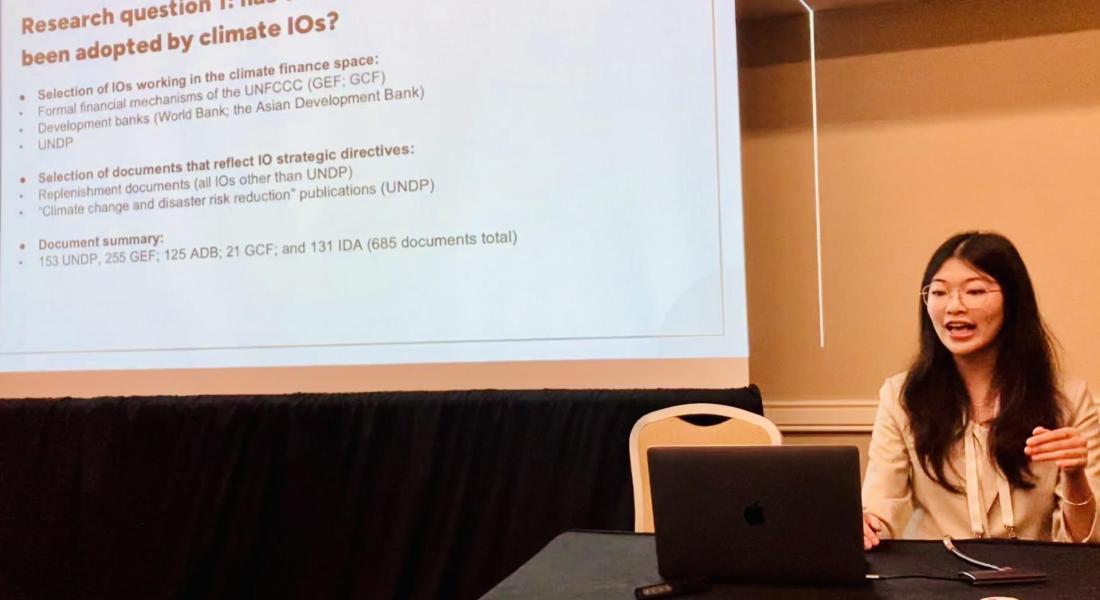
In the summer of 2023, I started working with Prof. Erin Graham as part of the Kellogg International Scholar Program. After more than a year of work, I had the privilege to present our co-authored research, “The De-Riskers: How International Organizations Conceive the Decarbonization Challenge and Their Role in the Green Energy Transition” at the American Political Science Association’s 2024 Annual Meeting and Exhibition (APSA) in Philadelphia, one of the largest political science conferences in the world. We presented our work as part of a five-paper panel, Climate Change and Global Governance, under the International Collaboration division. Through the presentation, I had a chance to discuss climate finance and development, share our findings, and exchange thoughts with leading experts in political economy and climate change.
In the research we presented, Prof. Graham and I investigate how international organizations (IOs) have shifted their climate efforts toward mobilizing private capital from institutional investors, like hedge funds, pensions, and investment firms, in order to fund decarbonization. To bring private capital off the sidelines, IOs adopt a “de-risking agenda:” a set of policies and financial instruments to reduce the perceived political and financial risks associated with climate investments in developing states. Our research investigates the extent to which the de-risking agenda has been adopted by IOs and how it is incorporated into their projects. Our findings reveal considerable evidence that the de-risking agenda has been adopted by IOs working in the climate space. We find that the language of institutional investors and de-risking became prevalent at climate IOs around 2009. IOs like the Green Climate Fund, Global Environment Facility, and United Nations Development Programme are now serving as financial advisors to states and domestic banks. What’s more, new financial instruments, like guarantees and equity investments are becoming common which raises important questions about accountability and effectiveness of IO efforts.
 Presenting at APSA was a milestone for my journey as a researcher since it was my first time attending an academic conference and presenting as a co-author. This conference allowed me to deepen my understanding of international collaboration through the lens of political economy and climate change and learn from some of the brightest minds in the field. Through the panel discussion and the comments we received from the discussion chair, I was able to learn from the valuable feedback from experts. Following the conference, I am looking forward to applying these insights to the ongoing research and working towards refining the paper for publication.
Presenting at APSA was a milestone for my journey as a researcher since it was my first time attending an academic conference and presenting as a co-author. This conference allowed me to deepen my understanding of international collaboration through the lens of political economy and climate change and learn from some of the brightest minds in the field. Through the panel discussion and the comments we received from the discussion chair, I was able to learn from the valuable feedback from experts. Following the conference, I am looking forward to applying these insights to the ongoing research and working towards refining the paper for publication.
Besides presenting the research, I also had the opportunity to listen to other panel discussions ranging from global institutional collaborations to global democracy development. Attending various panels at APSA greatly enriched my understanding and helped bring valuable insight for my future research. Listening to experts discuss their research methodologies in studying international collaboration gave me new perspectives on how to approach global organizational performance. I was particularly inspired to adopt a multimethod approach, combining both qualitative and quantitative techniques to comprehensively investigate the effectiveness of multilateral organizations and international non-governmental organizations.
I am deeply grateful to Prof. Erin Graham and the Kellogg Institute for International Studies for all the support and guidance, which made this opportunity possible. This experience has fueled my drive to continue working in the field of international development through research, and I can’t wait to implement the new ideas I’ve learned.





